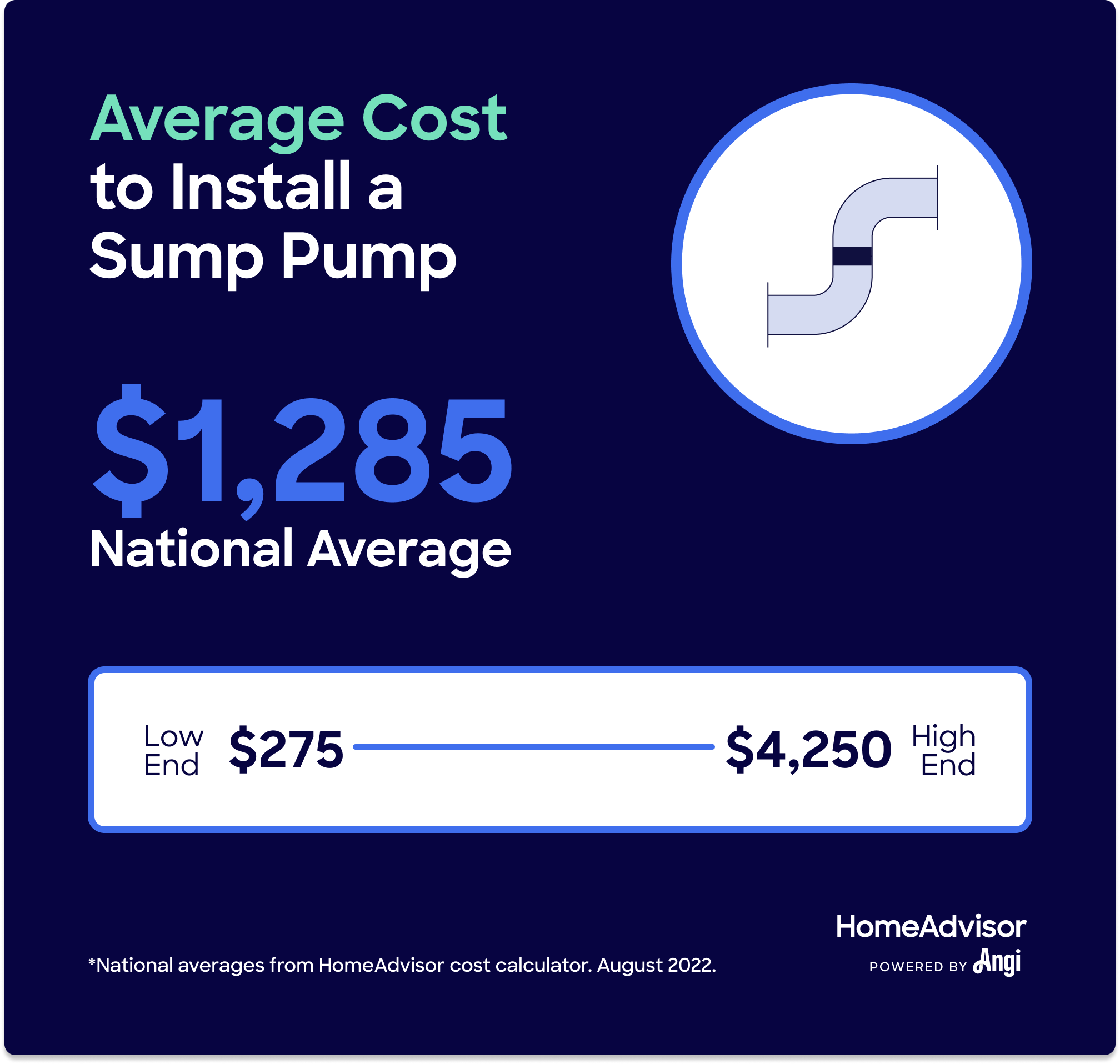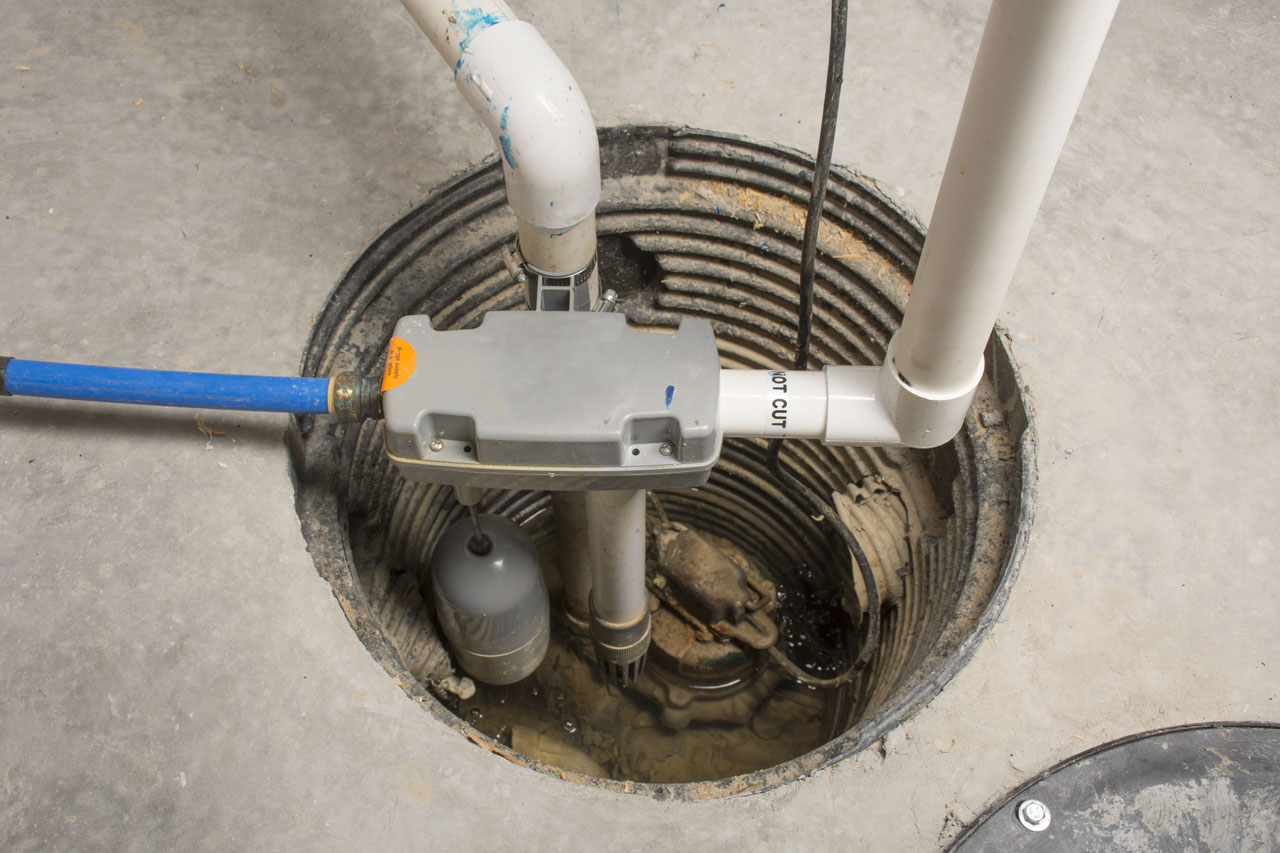How Much Does Sump Pump Installation Cost?
Typical Range:
$642 - $2,098
Typical Range:
$642 - $2,098
Cost data is based on actual project costs as reported by 1,657 HomeAdvisor members. Embed this data
.
.
.
.
.
.
.
.
.
.
.
.
.
.
.
.
.
.
.
.
.
.
.
.
.
.
.
.
.
.
•
•
•
•
Updated August 4, 2022
Reviewed by Jeff Botelho, Licensed Journeyman Plumber.Sump pump installation costs typically fall between $642 and $2,098, with $1,348 being about average. The price you pay will depend on the type of sump pump you need, the power the product has, and whether you pay a professional to install it or tackle the project yourself.
For example, pedestal sump pumps cost $60 to $170, while submersible units run $100 to $400. Generally speaking, you'll pay $45 to $200 per hour for the installation.
Learn the ins and outs of sump pump costs, plus factors like installation cost breakdowns in this guide.
Let's calculate cost data for you. Where are you located?
Where are you located?
| National Average | $1,348 |
| Typical Range | $642 - $2,098 |
| Low End - High End | $275 - $4,662 |
Cost data is based on actual project costs as reported by 1,657 HomeAdvisor members.
The area you choose to install a sump pump in your home could influence the price you pay.
Installing a sump pump in the crawl space can cost as much as $3,900. The total depends on the type of unit you want, the height of the work area, and how much time it takes to install. Crawl spaces can be notoriously difficult to access or work inside of, meaning labor costs may be higher than in an attic or basement.
Most crawl spaces are only one to three feet tall, which might also mean a professional has to use hand tools instead of full-size digging equipment.
Basement sump pump installs typically cost $640 to $1,915. That said, the cost could approach that $3,900 mark for crawl spaces if, again, factors cause it to take longer to install the device.
A professional might have to dig through the basement floor, which could be time-consuming even with the proper tools and room to work. Many basement waterproofing companies also offer rental programs for sump pump systems that can provide you with another layer of protection in the event of a pump failure.
Outdoor sump pumps are around $1,220 on average to install in yards prone to flooding. This can be especially important for areas where it rains frequently. Prolonged moisture exposure near your home's foundation can lead to cracks over time.
You need a submersible unit capable of withstanding high and low temperatures. The device you choose will also need to factor in the amount of area being cleared.
Pedestal and submersible sump pumps are homeowners' two most common options.
| Pump Type | Pump Cost |
|---|---|
| Pedestal | $80 – $150 |
| Submersible | $150 – $625 |
Pedestal pumps sit on the floor of the space you're trying to keep dry. They cost up to $275 without factoring in installation costs. They are generally used for areas where minor flooding is possible. The main benefit of these devices is related to their main drawback. They are very easy to access, so you can easily fix them if they stop working. But due to their accessibility, they are prone to clogs.
Well treated, your device can last up to 25 years.
Submersible sump pumps live in a hole beneath the ground. They cost up to $625. This type of sump pump is highly recommended for areas prone to serious flooding. They are more powerful than pedestal pumps and often quieter as well.
Newer models can last 10 to 12 years.
Sump pump replacements usually cost $275 to $1,000 since the replacement process does not take as much time as a new install. Because they take longer to access and often require digging, submersibles will cost on the higher end.
For the product alone, expect to pay anywhere from $80 to $625. Pedestal models are definitely cheaper, but you really need a sump pump fitted to the area you need to keep dry. It's better to pay more for what's required than to hope a lesser pump can do the job.
Here are all the factors that may influence the final price you pay to install a new sump pump.
Sump pump installations can vary greatly depending on the type of floor you have. Basement floors are usually concrete, and digging into those can add $2,500 to $5,000 to your final bill.
To make room for the reservoir, you must hammer through the surface with a jackhammer and other special tools. We highly recommend you let a professional do this.
Location always plays a factor, especially in rainier areas where a larger submersible unit is standard for preventing flooding. The cost of labor, permit fees, and your contractor’s hourly rates may also vary depending on where you live.
Many homeowners purchase flood insurance to go along with their new sump pump, especially if flooding in the basement or crawl space has been a chronic issue. It costs about $775 per year, but covers you in the event of serious flooding.
Sump pumps with battery backups are $1,220 on average. Basically, in the event of a power outage, your sump pump will use its stored battery life to keep running. Batteries with longer lives will cost more.
Alarms alert you if the water overpowers your pump, and many higher-end models come with a Bluetooth hook up that can directly notify you on your phone when it happens. When the water hits a certain level, the alarm sounds to tell you that the pump can't keep up with the flow.
A reserve pump costs $100 to $400. If severe flooding is common where you live, you might consider having multiple pumps. If your main pump cannot remove enough water, you can turn on the reserve pumps to add a little muscle to your system.
New filters cost about $60. One way to prolong the life of your sump pump is to purchase a filter every year, which ensures sediment and other foreign objects don't get stuck in it.
Budgeting for repairs is essential with your sump pump, especially if you know your basement, crawl space, or yard will get backed up with water. Set aside about $250 to cover sump maintenance and repair costs, which allows a pro to perform necessary actions to keep it running smoothly.
New sump pumps cost just under $700 on the high end, but you'll also need to budget $45 to $200 per hour to have a professional install it. They can likely install a pedestal pump in just an hour or two. Submersible pumps vary depending on the work you need to do first, such as digging or drilling.
If serious digging is involved in your basement or yard, hiring a reputable sump pump contractor is recommended. Damage to your foundation due to incorrect installation could cost tens of thousands of dollars to repair.
Most one-third- to one-half-horsepower sump pumps use 1,300 to 2,900 watts to start up. Then, they use 800 to 1,050 watts to continue running until the reservoir is empty.
To find the right sump pump size, dig out your 18-inch-wide reservoir and observe the water accumulation on a rainy day. Start with an empty reservoir and watch the rainfall for one full minute.
Measure the depth of the rainwater in inches and multiply by 60 to find the total number of gallons that builds up. Multiply that number by 1.5 for a bit of wiggle room. If it’s more than 35 gallons per minute, get a three-quarter-horsepower unit. Otherwise, one-third- to one-half-horsepower models will work.
Ask yourself these questions to figure out if it’s time to replace your sump pump:
Is it noisy? Bent or damaged impellers get quite noisy and fail to pump out enough water.
Is it getting power? If the unit turns on but doesn’t pump, it may have electrical issues.
Has it stopped working entirely? Check the float switch. If there’s no power, replace the pump.
Does the area smell bad? Sump pump odors often occur as the pump fails to operate correctly.
Not necessarily. If you want to hire a professional to handle the installation, you can go with a plumber or a handyman. You can also hire a specialized sump pump repair pro near you to handle the replacement or new installation.
No. You only need a sump pump if your basement floods during light to heavy rain. If you notice basement condensation instead, you might need basic waterproofing services.

